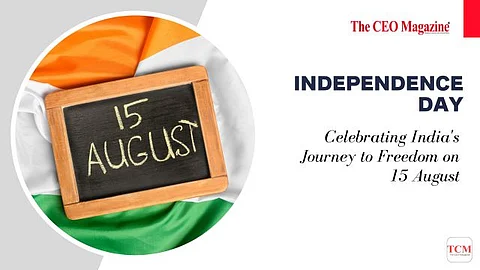
- News
- Women
- Magazine
- IndustryIndustry
- InsightsInsights
- Success Stories
- PublishPublish
- ContactContact
- Media KitMedia Kit

Independence Day
Celebrating India's Journey to Freedom on 15 August
India's struggle for independence is a testament to the indomitable spirit of a nation that fought against centuries of foreign domination. From the ancient era to modern times, India's pursuit of freedom has been marked by remarkable courage, resilience, and unity.
This article explores the historical trajectory of India's struggle for independence, highlighting key milestones, challenges, and the enduring legacy of this journey.
India's quest for independence dates back to ancient times when various regions on the subcontinent asserted their autonomy.
The Mauryan Empire's unification under Ashoka and the Gupta Empire's emphasis on self-governance were early instances of India's yearning for self-determination.
The arrival of European powers in India marked a new era of colonial rule. The British East India Company gradually consolidated control, leading to the First War of Indian Independence in 1857.
Though this initial attempt was quelled, it sparked a renewed sense of national consciousness, planting the seeds for future movements.
Mahatma Gandhi emerged as the face of India's struggle for independence, advocating nonviolent resistance and civil disobedience. His leadership during the Salt March and Quit India Movement galvanised millions and showcased the power of peaceful protest against British colonial rule.
As World War II ended, the demand for Indian independence gained international momentum. The struggle culminated in 1947 when India finally gained freedom, albeit at the cost of partition and communal violence that led to the creation of India and Pakistan.
India's journey to independence left an indelible mark on the nation's identity. The principles of unity, diversity, and nonviolence championed by leaders like Gandhi remain integral to India's ethos. The Constitution of India, adopted in 1950, enshrines the ideals of freedom, equality, and justice.
Post-independence India faced challenges of nation-building, economic development, and social equity. The nation's diverse population posed both opportunities and complexities in achieving a unified identity while respecting regional differences.
India's diversity also manifests in various regions asserting their identities and aspirations for autonomy. The states of Jammu and Kashmir, Telangana, and others have witnessed demands for separate status or self-governance.
India's journey to independence is a saga of resilience, sacrifice, and unity. From the ancient civilisations that nurtured ideas of self-governance to the modern nation that emerged from colonial shackles, India's history exemplifies the enduring human spirit's yearning for freedom.
The legacy of this struggle continues to shape India's values, governance, and its role on the global stage. As India forges ahead, it is essential to reflect on this historic journey and its lessons to create a brighter, more inclusive future for all its citizens.
Follow us on Google News
